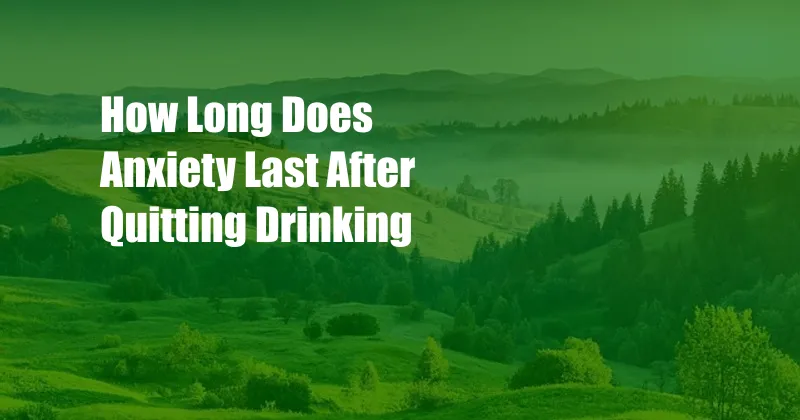
How Long Does Anxiety Last After Quitting Drinking?
Alcoholism is a major problem in the United States, with millions of people struggling with the disease. One of the most common symptoms of alcohol withdrawal is anxiety. Alcohol is a depressant, so when it is removed from the body, the brain can go into overdrive, causing anxiety and other unpleasant symptoms.
The duration of anxiety after quitting drinking can vary from person to person. For some, it may only last a few days, while for others, it may last for weeks or even months. The severity of the anxiety can also vary, from mild to severe.
Symptoms of Alcohol Withdrawal Anxiety
The symptoms of alcohol withdrawal anxiety can include:
- Racing thoughts
- Difficulty concentrating
- Irritability
- Restlessness
- Muscle tension
- Headaches
- Nausea
- Vomiting
- Diarrhea
- Seizures
Treatment for Alcohol Withdrawal Anxiety
The treatment for alcohol withdrawal anxiety will vary depending on the severity of the symptoms. For mild anxiety, self-care measures may be enough to manage the symptoms. These measures include:
- Getting regular exercise
- Eating a healthy diet
- Getting enough sleep
- Avoiding caffeine and alcohol
- Practicing relaxation techniques such as yoga or meditation
For more severe anxiety, medication may be necessary. Medications that may be used to treat alcohol withdrawal anxiety include:
- Benzodiazepines
- Antidepressants
- Beta-blockers
Preventing Alcohol Withdrawal Anxiety
The best way to prevent alcohol withdrawal anxiety is to avoid drinking alcohol. If you are struggling with alcoholism, there are many resources available to help you get sober.
Tips for Managing Anxiety After Quitting Drinking
Here are some tips for managing anxiety after quitting drinking:
- Talk to your doctor. They can help you determine if you need medication or other treatment for your anxiety.
- Join a support group. There are many support groups available for people who are struggling with alcohol addiction and anxiety.
- Learn relaxation techniques. Relaxation techniques such as yoga, meditation, and deep breathing can help to reduce anxiety.
- Avoid caffeine and alcohol. Caffeine and alcohol can worsen anxiety.
- Get regular exercise. Exercise can help to reduce stress and improve mood.
- Eat a healthy diet. Eating a healthy diet can help to improve your overall health and well-being.
- Get enough sleep. When you don’t get enough sleep, you are more likely to experience anxiety.
It is important to remember that anxiety is a common symptom of alcohol withdrawal. If you are experiencing anxiety after quitting drinking, do not be afraid to seek help. There are many resources available to help you manage your anxiety and get sober.
FAQs on Anxiety After Quitting Drinking
Q: How long does anxiety last after quitting drinking?
A: The duration of anxiety after quitting drinking can vary from person to person. For some, it may only last a few days, while for others, it may last for weeks or even months.
Q: What are the symptoms of alcohol withdrawal anxiety?
A: The symptoms of alcohol withdrawal anxiety can include racing thoughts, difficulty concentrating, irritability, restlessness, muscle tension, headaches, nausea, vomiting, diarrhea, seizures, and tremors.
Q: How can I treat alcohol withdrawal anxiety?
A: The treatment for alcohol withdrawal anxiety will vary depending on the severity of the symptoms. For mild anxiety, self-care measures may be enough to manage the symptoms. For more severe anxiety, medication may be necessary.
Q: How can I prevent alcohol withdrawal anxiety?
A: The best way to prevent alcohol withdrawal anxiety is to avoid drinking alcohol. If you are struggling with alcoholism, there are many resources available to help you get sober.
Conclusion
Anxiety is a common symptom of alcohol withdrawal. The duration and severity of the anxiety can vary from person to person. There are a number of things you can do to manage anxiety after quitting drinking, including talking to your doctor, joining a support group, learning relaxation techniques, and avoiding caffeine and alcohol.
Are you interested in this topic? Leave a comment below.